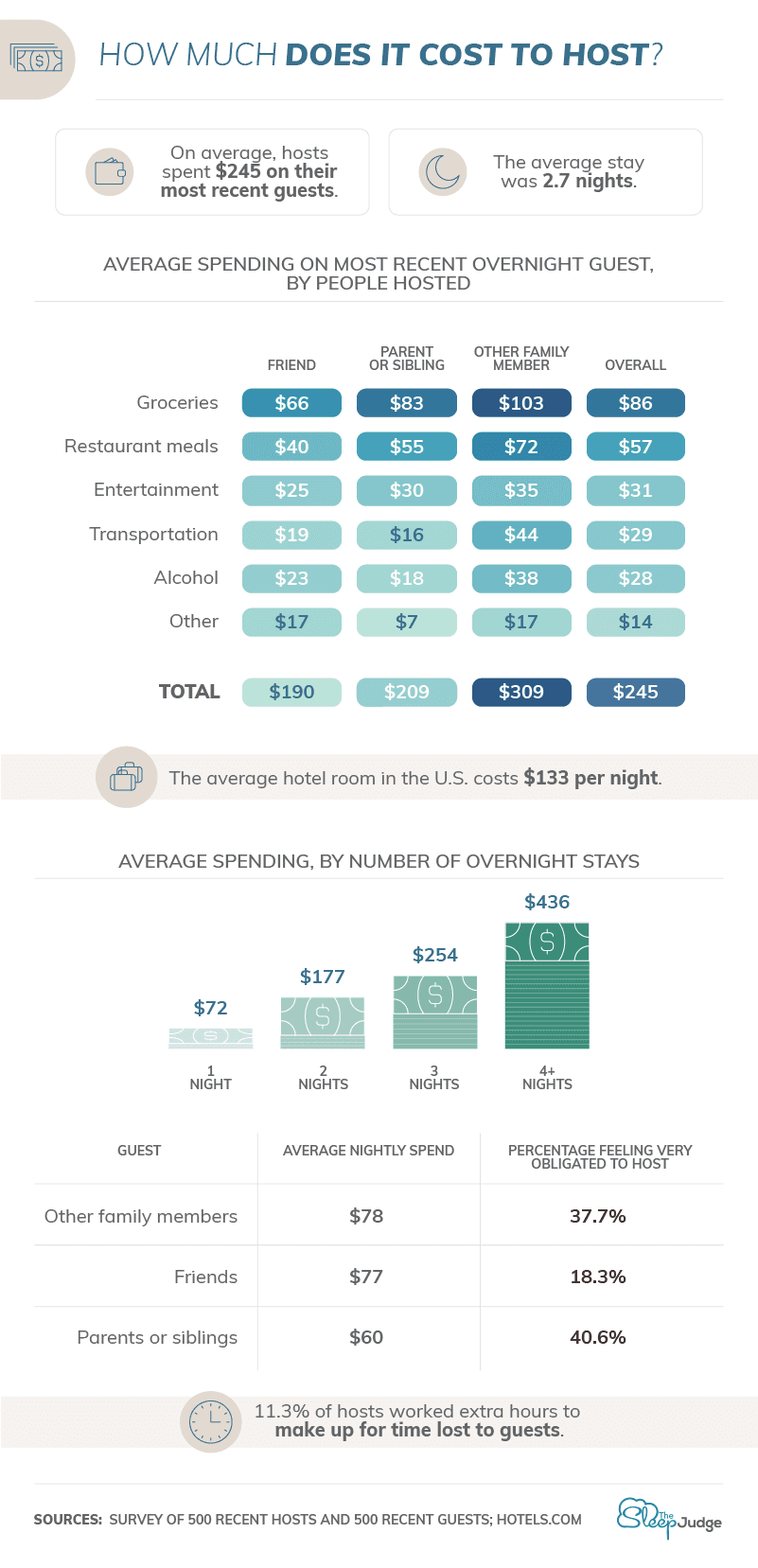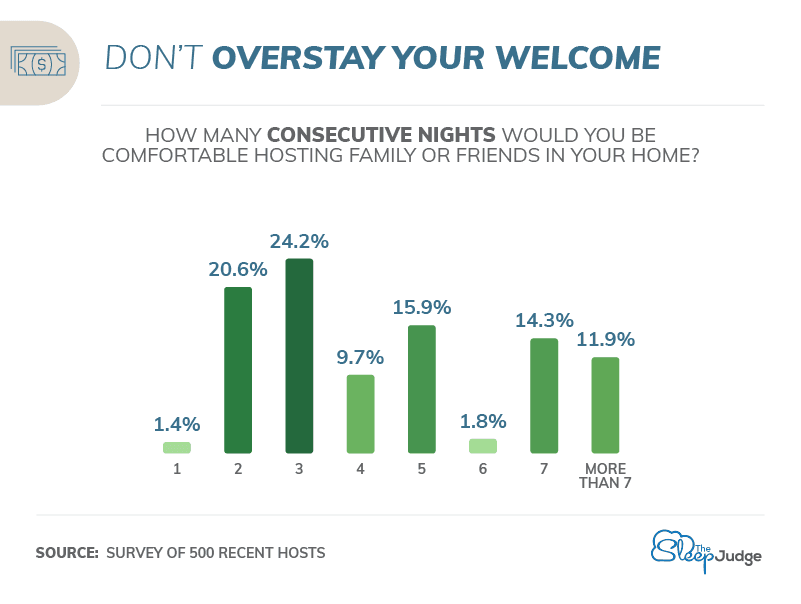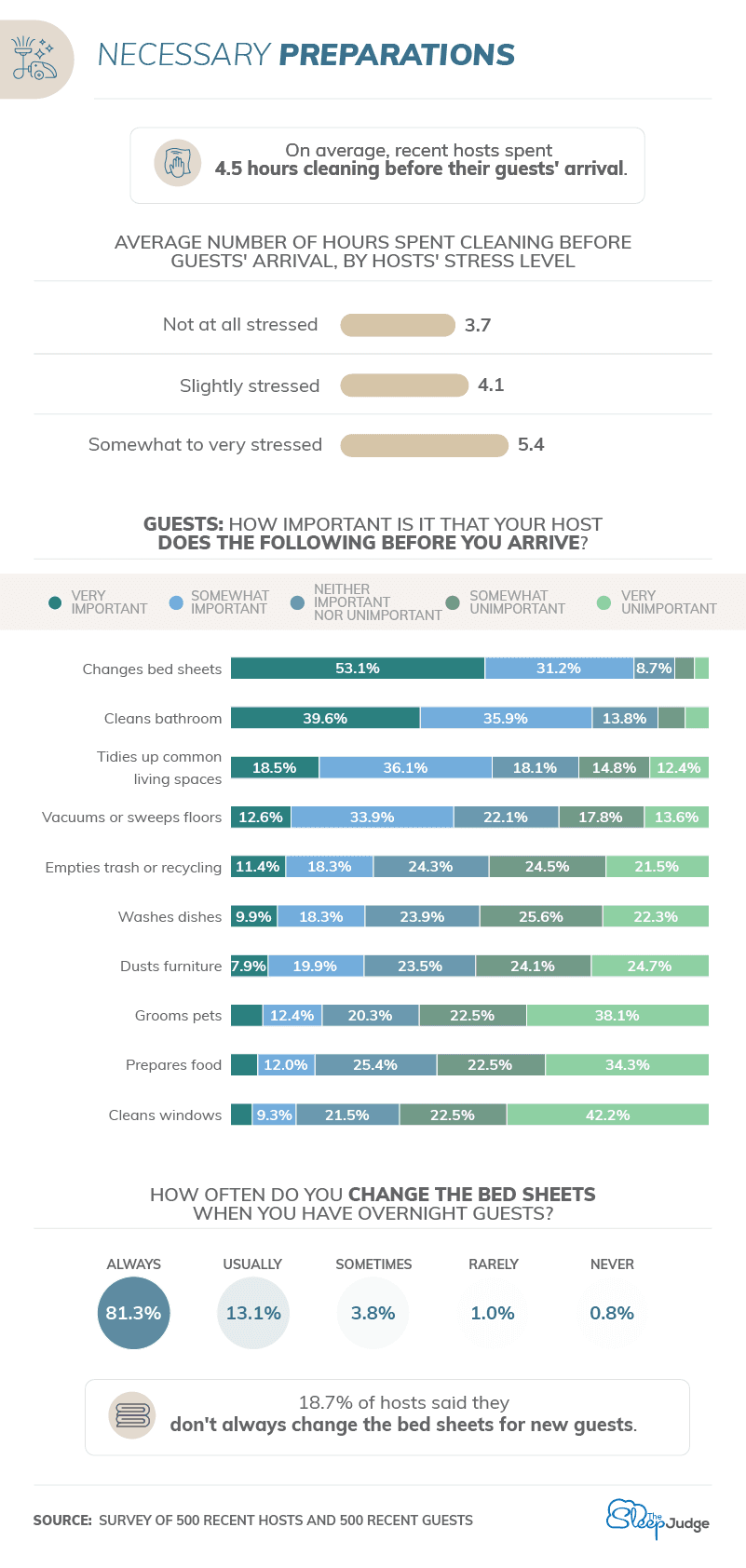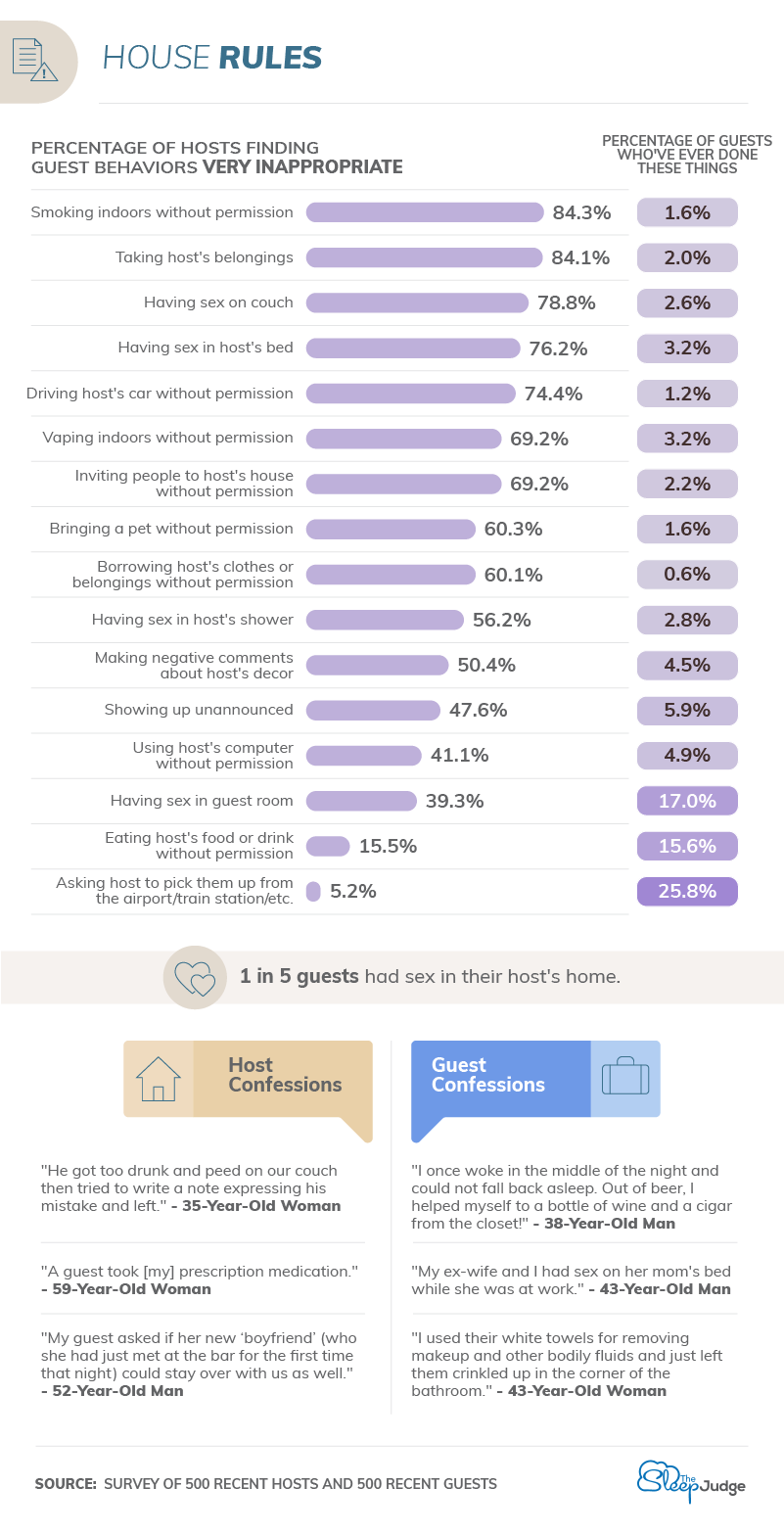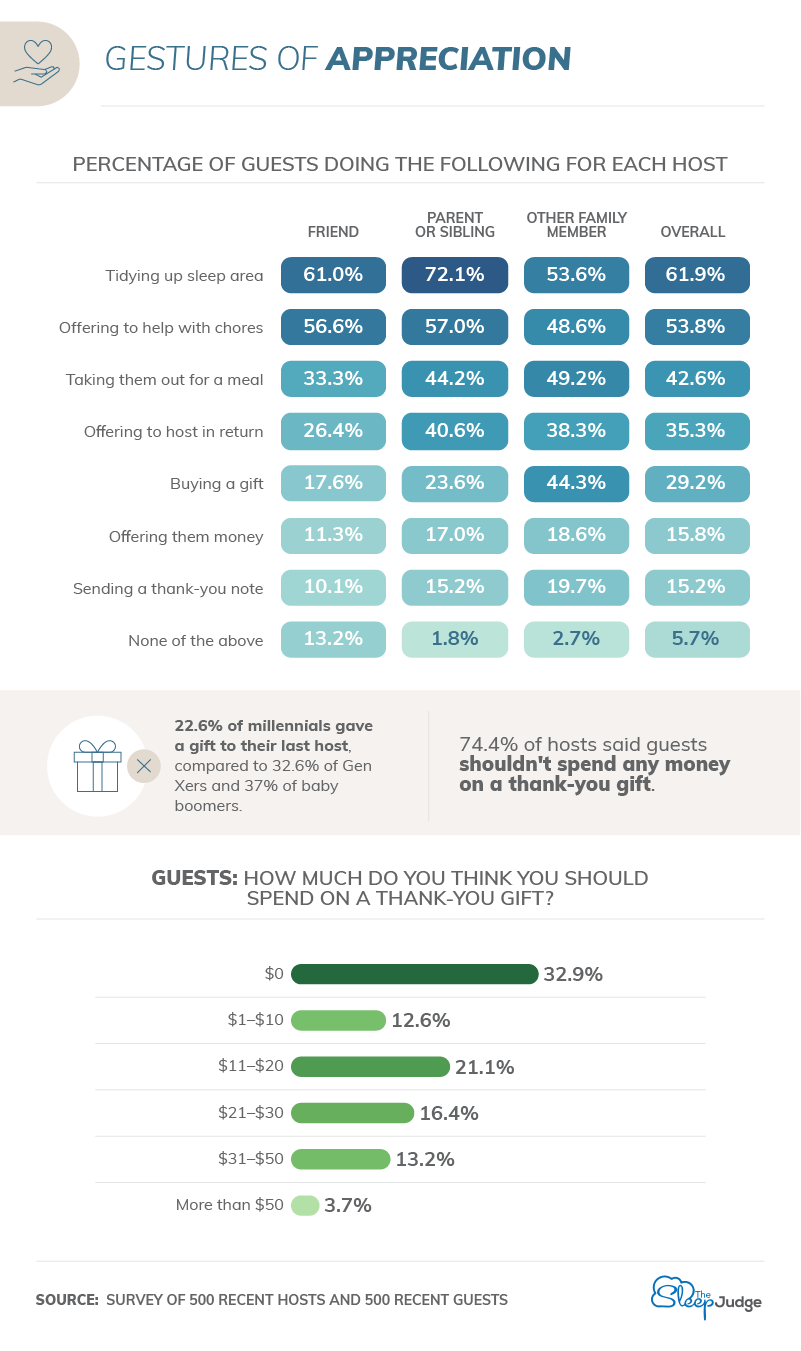Let’s face it: Hosting at your home can be hard. Even if you love extending hospitality to others, welcoming overnight guests can cause plenty of stress. From frantic cleanings to meal planning, the impending arrival of visitors prompts a long to-do list.
Then there’s visitor behavior: When guests get on your nerves, their very presence can feel like an invasion. Worse still, some folks overstay their welcome, making you rue the day you invited them. Shouldn’t we all aspire to do better by our hosts, imposing as little as possible?
In the spirit of helping hosts and guests everywhere, we surveyed 500 people who had recently stayed at someone else’s home and 500 who had recently hosted others. Our findings illustrate the sacrifices hosts make to welcome visitors and their biggest guest pet peeves. Additionally, our data shows how guests demonstrate their gratitude, either by giving gifts or pitching in around the house. For the keys to good host and guest conduct, keep reading.
High Price of Hospitality
Hosting demands more than a warm welcome: The financial investment of having guests is often substantial. On average, hosts spent $245 on their most recent guests, with groceries and restaurant meals being the largest spending categories.
Indeed, many people felt obligated to cater to their visitors’ culinary preferences, but stocking up on ingredients and snacks can be an expensive proposition. Interestingly, people tended to spend the most when other family members stayed with them. Perhaps with close friends or immediate family, the pressure to impress is less intense.
Of course, hosting expenses mounted over longer stays. Among hosts whose guests stayed for four or more nights, the average cost was $436. Moreover, some hosts sacrificed working hours to perform their hosting duties, and about 11% said they had to make up for the time spent attending to guests.
Given these sacrifices, do people actually enjoy having overnight visitors – or do they feel compelled to take others in? Among hosts who had other family members over, more than a third said they hosted because they felt obligated to do so. To be sure, turning a guest away can have large financial implications. Given that the average hotel room costs roughly $133 a night, not hosting could cost your visitors hundreds.
The line between a welcome visitor and a lingering nuisance can be difficult to define. How long is too long to spend in someone else’s home? For roughly a quarter of hosts, visits of seven or more nights seemed just fine. But most people preferred much shorter overnight stays: On average, hosts said they would be comfortable with guests staying for a maximum of two to three nights. This roughly coincides with recommendations from some etiquette experts who say visitors who stay for more than three days are at definite risk of imposing.
Getting Ready for Guests
Cleaning in advance of guests’ arrival can be labor-intensive, demanding more than the chores you usually perform. Accordingly, hosts spent an average of 4.5 hours readying their homes – and their efforts reflected their degree of hosting anxiety. Among those who felt “somewhat to very stressed” about the prospect of having guests, the average cleaning time was 5.4 hours.
In the eyes of guests, however, which kinds of cleaning are truly necessary? The top priority was changing the bed sheets, with 53% of guests describing it as “very important.” Unfortunately, nearly 1 in 5 hosts admitted to not always changing the sheets for new guests – an unsettling statistic for visitors everywhere. However, as our past research has proven, hotels aren’t perfect either when it comes to clean bedding.
The bathroom was another area of emphasis for guests, with 40% describing cleaning the bathroom as a “very important” chore for hosts to perform. Indeed, as cleaning pros point out, bathrooms are a prime place for grime to be discovered: Guests are in them alone with good lighting and few distractions.
Visitor Violations
From a host’s perspective, which guest behaviors qualify as inconsiderate or obnoxious? Smoking indoors without permission was widely seen as unacceptable: The smell can linger for days, and so-called “thirdhand smoke” is a significant health risk. Theft was another obvious faux pas, with more than 80% of hosts saying it would be “very inappropriate” for guests to take their personal belongings.
The prospect of guests having sex also made many hosts uncomfortable – especially if visitors got romantic on the couch or the host’s bed. Thirty-nine percent of hosts even felt it would be inappropriate for visitors to have sex in the guest room. Yet, around 1 in 5 guests reported getting it on during their stay, suggesting many travelers don’t leave their libidos at home.
Additionally, most hosts objected to their guests bringing others over unannounced – whether these unsanctioned visitors were people or pets. Sixty-nine percent said it would be very inappropriate for guests to bring other people over without permission, and 60% objected to visitors bringing pets without asking first.
Guests’ Gratitude
If some guests’ behaviors are egregious, many more take a conscientious approach. To demonstrate their appreciation for their hosts, a majority of guests neatened up the area in which they stayed and offered to help with household chores. Other common ways of indicating gratitude included taking the host for a meal out and offering to host them in turn. While these gestures may strike some as basic guest obligations, they’re not universal: Roughly 6% of guests made no such effort to demonstrate their appreciation.
The subject of thank-you gifts raised interesting generational contrasts: Baby boomers were the most likely to give a token of gratitude, but Gen Xers and millennials were significantly less inclined to do so. While one could fault millennials’ much-maligned manners, our results suggest that houseguest gift etiquette is somewhat complex.
Many etiquette experts do recommend showing up with some sort of present. But when we asked hosts about this, a majority said their visitors shouldn’t spend money on thank-you gifts. Guests expressed similar views; most said gifts should cost little or nothing. So what can you do to show appreciation without being ostentatious? One option is writing a heartfelt thank-you note, something just 15% of guests did.
Hosting Successfully, Sleeping Peacefully
Our findings confirm that hosts face plenty of potential frustrations, from inconsiderate visitor behaviors to the sheer expense of putting others up. Yet, most hosts are invested in providing a positive experience, spending hours to prepare their home for guests.
Certainly, many people feel obligated to welcome visitors, rather than eager to have others stay over. But our data suggests that most hosts genuinely want their guests to enjoy themselves and go to great lengths to offer a warm welcome. When visiting others, therefore, we should do what we can to acknowledge their efforts. Our findings suggest that tokens of gratitude don’t need to be expensive, but they can emphasize your appreciation in a distinctive way.
At The Sleep Judge, we can assist with at least one aspect of hosting: Helping your guests get a great night’s sleep. With our expert reviews and buying guides, you’ll be able to pick the perfect mattress for your guest room, with recommendations for every price range. When everyone under your roof sleeps well, you’re far more likely to enjoy your hosting duties.
Methodology and Limitations
We surveyed 500 people who had hosted friends or family overnight in their homes in the last 12 months and 500 who had been hosted overnight by friends or family in the last 12 months. Each group was asked about their most recent experiences hosting or being hosted, as well as more general questions about their opinions about proper behavior when visiting the homes of other people.
Fifty-three percent of recent hosts were female, and 47% were male. 21.2% of hosts were baby boomers, 35.1% were Gen Xers, and 43.7% were millennials. They ranged in age from 22 to 72 with a mean of 41.3 and a standard deviation of 11.9.
To determine the average cost to host guests per night, we divided hosts’ total spending on their most recent guests by the number of nights their guests stayed most recently.
We grouped answer responses in some instances to simplify visualizations and to maintain quality sample sizes.
This study was based on self-reported data, so it could be influenced to some degree by minimization, exaggeration, and telescoping. It is based on means, and it neither weighted nor statistically tested.
Fair Use Statement
We encourage you to share this project with friends and family (or possibly a guest you plan to host soon). If you do use our findings and graphics, please do so only for noncommercial purposes. We also ask that you link back to this page whenever you share our work, allowing other readers to find our full results.

